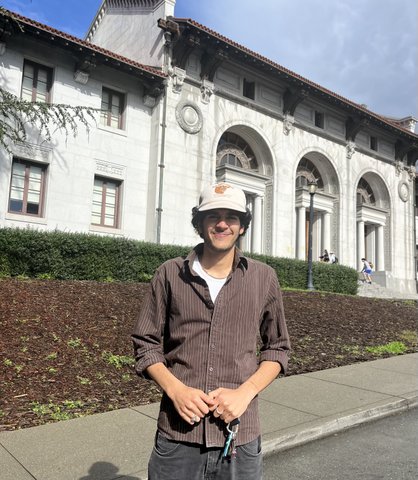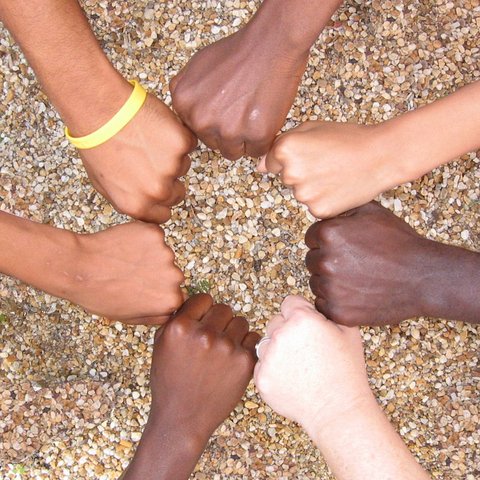
01 Feb Proximity: Growing Up in a Multicultural Community Makes Us Less Prone to Racism

Hamza Fahmy at UC Berkeley, where he is currently a student. He immigrated to the U.S. from Egypt in 2018 to go to school. (Natasha Kaye / CC Pulse)
Commentary, Hamza Fahmy
I left my hometown in Egypt in 2018 to come to the United States. At the time, I didn’t know anything about the culture — or race relations — in this country, but that would quickly change.
I was a recent high school dropout, and the only places that would take me were American community colleges. I ended up in California, where I still live for school. But first, my old friend David invited me to his lake house in his hometown in rural Alabama.
I was unaware of anything related to American culture at the time, especially anything related to the rural South. So out of curiosity, I enthusiastically agreed.
I landed in Atlanta. Then, David and I had to drive more than 200 miles to his hometown in Prairie, Alabama, a small, unincorporated community.
Aside from one too many corn fields and the occasional cow spotting, the trip was mundane, to say the least. That is, until we needed to make a stop for gas.
The gas station was tucked away between two corn fields in rural Georgia. As David filled the car with gas, I decided to meander to the back, where the gas station arcade was. Yes — an arcade but in a gas station.
As I was minding my own business playing Street Fighter 4, two older gentlemen approached me on both sides. They asked me many questions, most relating back to my Egyptian heritage, and its potential “problematic” ties to the Islamic faith.
It was clear that I was the first North African these men ever met.
I took their curious questions as a precursor of the South’s famed “hospitality” everyone spoke of. So I give them the benefit of the doubt and decide to socialize with them.
My friend called my name from outside and told me we needed to go. I’m grateful he did so, because as I left the arcade, I was increasingly berated with a storm of racist insults.
Many of these insults I had never even heard of before. They were hurtful but creative. They had managed to incorporate multiple niches of racism into one sentence — a hateful poetry, to say the least.
I wanted to confront them, but I also felt out of place. So I decided to walk away and continue to take the insults as I made my way to the car.
To this day, those insults have never left me. I, of course, had experienced racism before, but I had never experienced it so shamelessly. It was as if these people felt they not only had the right to insult my ethnicity, but rather, that it was an act of nobility to do so.
As I processed these insults after we left, I looked out my car window, and I found a man poking at a fire with a wooden stick on the side of the freeway. As we drove past, I then saw a large swastika tattoo on his right shoulder.
It was at this point I realized Americans had a unique relationship with racism.
My view of American racism, of course, changed over time. Now, I live in the Bay Area, which isn’t nearly as bad as the rural South when it comes to acts of racism.
I remember moving to California — I went to community college in Santa Barbara before transferring to UC Berkeley — and noticing an optimistic curiosity toward my culture that I had never experienced before. People celebrated my culture, instead of resenting it.
And I believe the main reason why Bay Area natives tend to be less racist than many of their American counterparts is proximity.
Similar to the rural south, Egypt is an area that was mostly populated by one race, with the majority leaning religiously conservative. This led to many of us having assumptions about what was out there, oftentimes leading us to have racist ideologies of distant races.
It was by moving to this country and meeting people from different backgrounds that I was able to disprove my assumptions on a distant culture I knew nothing but rumors about prior.
Indeed, hatred is oftentimes fought, and changed, through conversation.
Before coming to California, I thought Americans were a rather hateful race. One that didn’t welcome immigrants attempting to start a life in their country.
Those who want to practice a faith or a culture in a rather disciplinary manner — like some examples found in the rural South — also end up believing that others are there to either disrupt or corrupt their preserved culture.
By villainizing others, we also end up alienating ourselves from them. But how is one supposed to have a conversation with a foreign culture, when the culture itself is so physically distant?
The men at the gas station were not racist to me because they actively distanced themselves from people like me, but rather, it just so happened that I was surely the first North African to step foot into that arcade gas station, and they were not socially well-equipped enough to feel comfortable around a foreigner like myself.
Through growing up among a diverse set of cultures like one does in the Bay Area, one becomes naturally more well acquainted with them, and even allows one to see similarities between a distant culture and their own.
This not only allows more people to coexist, but as a result, even reduces their chances toward both believing, and performing, in acts of racism.
It is by coexisting among other cultures, and by being curious about other cultures, rather than being fearful of them that one can get an idea of both sides of the story, and how one can embrace our coexistence, rather than fear it.
This resource is supported in whole or in part by funding provided by the State of California, administered by the California State Library in partnership with the California Department of Social Services and the California Commission on Asian and Pacific Islander American Affairs as part of the Stop the Hate program. To report a hate incident or hate crime and get support, go to CA vs Hate.





No Comments